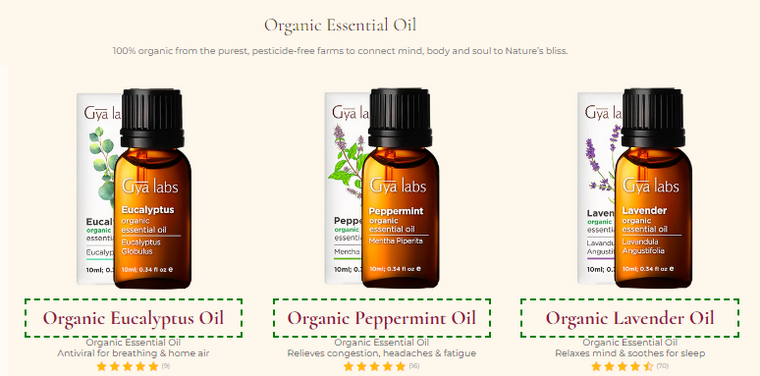- 1-905-452-8193
- Contact Us
- Member Login
- Get Listed Today
- 220,911 members

In a world where the pursuit of holistic well-being is gaining momentum, organic essential oils have emerged as powerful allies in the quest for a healthier and more balanced life. These potent extracts, derived from various plant sources, have been used for centuries across different cultures for their therapeutic properties. In recent times, the popularity of organic essential oils has surged, thanks to their natural composition and a myriad of benefits that cater to physical, mental, and emotional well-being.
Understanding Organic Essential Oils:
Organic essential oils are concentrated extracts derived from plants, capturing the aromatic compounds responsible for the plant's fragrance. These oils are often obtained through methods like distillation or cold pressing, ensuring that the natural properties of the plants are preserved without the use of synthetic additives or chemicals. The term "organic" in this context refers to the farming practices employed, which avoid the use of synthetic pesticides, herbicides, and fertilizers.
Key Benefits of Organic Essential Oils:
Pure and Unadulterated:One of the primary advantages of organic essential oils is their purity. Being free from synthetic additives, pesticides, and genetically modified organisms (GMOs), these oils maintain the integrity of the plant's natural compounds. This ensures that users experience the unadulterated benefits without exposing themselves to potentially harmful substances.
Therapeutic Properties:Organic essential oils are renowned for their therapeutic properties, which can have a profound impact on both physical and mental well-being. For example, lavender essential oil is celebrated for its calming and sleep-inducing effects, while peppermint oil is often used to alleviate headaches and improve focus.
Aromatherapy:Aromatherapy, the practice of using scents to influence mood and promote a sense of well-being, relies heavily on organic essential oils. These oils, when diffused or applied topically, can stimulate the olfactory system and trigger positive emotional responses. The organic nature of these oils enhances the therapeutic experience, making it a popular choice for those seeking natural alternatives to conventional aromatherapy.
Skin and Hair Care:Many organic essential oils offer remarkable benefits for the skin and hair. Tea tree oil, known for its antibacterial properties, is often used to treat acne and various skin conditions. Rosemary oil, on the other hand, is recognized for promoting hair growth and improving scalp health. The absence of synthetic chemicals in organic essential oils makes them gentle on the skin, suitable for a wide range of skin types.
Immune System Support:Certain organic essential oils possess immune-boosting properties. Oils like eucalyptus and tea tree have been traditionally used to combat respiratory issues and support the immune system. Using these oils in a diffuser or as part of a massage oil can contribute to a healthier immune response.
Stress Reduction:Organic essential oils play a crucial role in stress reduction. Oils like chamomile, bergamot, and frankincense are known for their calming effects, helping to alleviate stress and anxiety. The organic nature of these oils ensures that users can relax without the worry of exposing themselves to harmful synthetic chemicals.
Natural Cleaning Solutions:The antimicrobial and antibacterial properties of certain organic essential oils make them excellent additions to natural cleaning solutions. Oils like lemon, tea tree, and eucalyptus can be used to create effective and chemical-free cleaning agents, promoting a healthier living environment.
Mood Enhancement:The aromatic compounds in organic essential oils have the ability to influence mood and emotions. Citrus oils, such as orange and grapefruit, are known for their uplifting properties, making them ideal for boosting mood and combating feelings of lethargy.
Environmental Impact:Choosing organic essential oils also has positive implications for the environment. Organic farming practices promote soil health, biodiversity, and sustainable agricultural methods. By opting for organic essential oils, consumers contribute to a more eco-friendly and sustainable supply chain.
Versatility:Organic essential oils are incredibly versatile, offering a range of applications. Whether used in massage oils, bath products, diffusers, or homemade cleaning solutions, the adaptability of these oils makes them valuable additions to a holistic lifestyle.
Conclusion:
The growing popularity of organic essential oils is a testament to society's increasing interest in natural and holistic approaches to well-being. From promoting relaxation and managing stress to supporting the immune system and enhancing mood, these oils have become indispensable in the quest for a healthier and more balanced life. The organic nature of these oils ensures that users can harness their benefits without compromising on purity or exposing themselves to harmful synthetic chemicals. As the world continues to embrace the power of nature, organic essential oils stand out as fragrant ambassadors of well-being, inviting individuals to experience the countless benefits that arise from a harmonious connection with the natural world.
